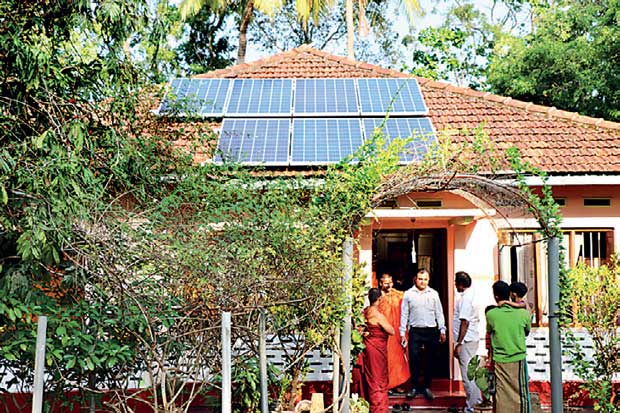12 May 2017 - {{hitsCtrl.values.hits}}

World Buddhist leaders have agreed to hold the UN International Vesak Festival in Sri Lanka from May 11 to 13, and this is the first time Sri Lanka has been given the opportunity to host this festival.
Accordingly, the inauguration of the 14th UN Vesak Day will take place at the BMICH with President Maithripala Sirisena, Indian Prime Minister Narendra Modi and a host of over 2000 other national and international delegates participating representing several countries.
During this year’s UN International Vesak Festival in Sri Lanka, JLanka Technologies - country’s pioneer in Next Generation Solar Solutions stand as the largest Solar Energy Player in the country that has helped key Buddhist Temples.
Iconic and historic Buddhist monuments to switch towards the solar photovoltaic systems following the Buddhist teachings of causing no harm - to sentient beings or to the environment.
Buddhist economics follows from the guiding Principle of Skillful Livelihood, one of the lessons of the Lord Buddha’s fourth noble truth of the noble eightfold ppath. The guiding principle embodies causing no harm - to sentient beings or to the environment - in its most inclusive sense - because people must live and live skillfully they must resolve their economic needs without causing suffering. The keynotes of Buddhist economics are simplicity ecology and non-violence. In Buddhist economics, the purpose of economic life is to obtain a maximum of well-being with a minimum of consumption. This means that producing locally for local or a global community needs is the most rational economy.
Thus, the teachings of the Lord Buddha counsel a reverent and non -violent attitude toward not only all sentient beings but also nature as a whole. Therefore going in terms of Buddhist philosophy, since our ‘ultimate power source’ is the sun, solar power is one of the main renewable energy sources and an energy source that doesn’t cause collateral damage to the our environmental and ‘environmental balance’ unlike to the burning of fossil fuels for power production.
Going along this footpath and in parallel with government’s Solar Power Revolution project, JLanka since early last year has taken an initiative to light the country’s premier and historic religious temples, five major scared sites of historic and sacred Atamasthana in Anuradhapura including Thuparamaya , Abhayagiriya, Jetavanaramaya, Mirisavetiya, Lankaramaya and the Sri Dalada Maligawa or the Temple of the Sacred Tooth Relic, Malwathu Maha Viharaya, Asgiri Maha Viharaya, Thanthririmale Rajamaha Viharaya, Somawathi Rajamaha VIharaya and Bellanwila Rajamaha Viharaya. This initiative has helped the religious places and temples at large to bring down their energy and utility bills while contributing to a more greener and a sustainable environment which had also resulted in indirect motivation on the devotees to switch to renewable energy going along with their religious principles.
JLanka has also taken the solar power footprint to illuminate the Archdiocese of Colombo, Muslim mosque in Ratnapura, Sabaragamu Maha Saman Devalaya, Nallur Kandaswamy Temple Jaffna, and the Koneswarama Temple.
JLanka Technologies, being the country’s pioneer in next generation solar solutions has come up with this novel concept of powering religious places with solar photovoltaic systems as it brings the religious places to green energy movement and the sustainability models.
Government of Sri Lanka has also selected JLanka as a partner of the ‘Sorrya Bala Sangramaya’ project (Solar Power Revolution) as result of JLanka’s proven strong capacity of delivery and commitment to the innovation in transforming Sri Lanka into solar powered nation.
10 Jan 2025 18 minute ago
10 Jan 2025 23 minute ago
10 Jan 2025 2 hours ago
10 Jan 2025 2 hours ago
10 Jan 2025 2 hours ago